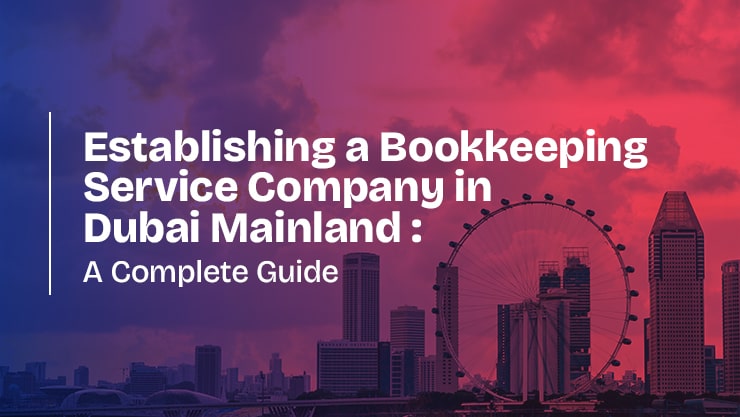Establishing a Bookkeeping Service Company in Dubai Mainland: A Complete Guide

Dubai, known for its booming economy and business-friendly environment, presents exceptional opportunities for entrepreneurs. Among the various industries flourishing in this dynamic city, bookkeeping services in Dubai are gaining significant traction. This blog provides a detailed guide on setting up a bookkeeping company in Dubai Mainland, ensuring a smooth and successful start to your venture.
Understanding the Legal Requirements for Establishing a Bookkeeping Company in Dubai
Before launching your bookkeeping company in Dubai, it's crucial to acquaint yourself with the legal prerequisites and the specific licensing requirements set by the local authorities.
Legal RequirementsSeveral legal requirements must be met to begin providing bookkeeping services in Dubai. Some of these include:
- Partner or Sponsor: A UAE national must be a partner or sponsor, owning at least 51% of the company's shares.
- Licenses and Permits: Relevant licenses and permits must be obtained from the Department of Economic Development (DED).
- Compliance with Regulations: The company must comply with the accounting and auditing regulations stipulated by the UAE authorities.
The DED is the principal authority issuing licenses for bookkeeping services. The type of license you need depends on your company's activities and structure. You can choose from:
- Commercial License: This is for companies engaged in trading activities.
- Professional License: This license is for professionals offering specific services, like bookkeeping or accounting.
- Industrial License: This license is for companies involved in manufacturing or industrial activities.
Selecting the Legal Structure for Your Bookkeeping Company in Dubai
The legal structure of your company significantly impacts its operations, liability, and taxation. Here are the most common legal structures for bookkeeping company in Dubai:
- Sole Proprietorship: This is suitable for individuals who wish to independently operate their bookkeeping business.
- Limited Liability Company (LLC): This is ideal for partnerships or multiple shareholders as it provides limited liability protection.
- Professional Company: This is recommended for professionals like accountants who want to provide bookkeeping services.
It may be beneficial to consult a legal advisor to choose the best structure for your bookkeeping company based on your specific needs.
Choosing and Registering a Trade Name for Your Company
Selecting a unique and catchy trade name is pivotal for branding your bookkeeping company. The name should align with your business goals and not resemble any registered trademarks or existing companies in the UAE. Once you've selected a name, submit an application to the DED for approval.
Securing Initial Approval from DED
To advance with the registration process, you need to procure initial approval from the DED. The required documents for this step include:
- Completed application form.
- Business plan outlining the nature of your bookkeeping services.
- Copies of valid passports of the partners or shareholders.
- No objection letter from the UAE sponsor or partner.
- Memorandum of Association (MOA) for an LLC or professional company.
- Leasing Office Space for Your Bookkeeping Company
As part of the registration process, acquiring an office space in Dubai mainland is necessary. The size and location requirements may vary based on your specific business needs. Make sure the leased premises are approved by the Dubai Municipality and adhere to their regulations.
Obtaining Final Approval and Licensing
After completing all the above steps, you can proceed to obtain the final approval and license for your bookkeeping company. This involves submitting the necessary documents to the DED and paying the required fees. Upon review and approval of your application, the DED will issue your business license.
Registering for Value Added Tax (VAT)
Bookkeeping companies in Dubai must register for Value Added Tax (VAT) if their annual revenue surpasses the threshold set by the Federal Tax Authority (FTA). Ensure you familiarize yourself with the VAT regulations and complete the registration process within the specified timeframe.
Recruitment and Compliance
With your license in hand, you can now focus on recruiting skilled bookkeepers and ensuring compliance with relevant regulations. Register your employees with the Ministry of Human Resources and Emiratisation (MOHRE) and obtain work visas if required.
Conclusion
Establishing a bookkeeping company in Dubai mainland requires meticulous planning and adherence to legal requirements. By following the steps outlined in this guide, you're well on your way to starting a successful bookkeeping business in Dubai. Always seek professional advice from top accounting and auditing firms in Dubai when necessary and stay updated with the latest regulations in the UAE.
Now that you're equipped with the knowledge to set your bookkeeping company up in Dubai, it's time to embark on your business journey. Good luck!
Contact us for Expert Advice
This guide is intended to provide you with a basic understanding of the process of setting up a bookkeeping company in Dubai. For more comprehensive assistance, consider reaching out to our professional services that specialize in the registration and business setup in Dubai. Centriz can help you navigate through the process more smoothly and address any specific queries or concerns you might have. If you have any inquiries or require additional assistance, don't hesitate to contact us. We're here to help!.Our team of experts is always ready to provide guidance and support to help you establish your bookkeeping services in Dubai.
Remember: While this guide offers valuable insights, always consult with a legal expert or business consultant before making any major decisions. Laws and regulations can change, and each business situation is unique.
 +971 5286 52718
+971 5286 52718
